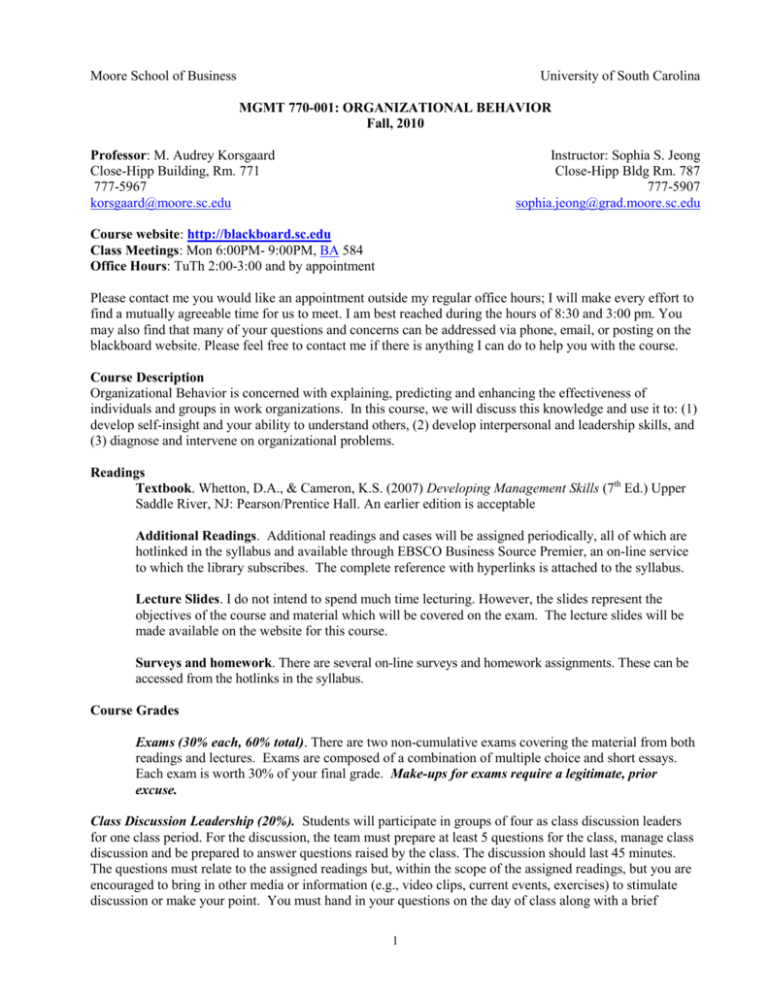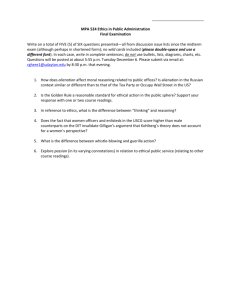
Moore School of Business
University of South Carolina
MGMT 770-001: ORGANIZATIONAL BEHAVIOR
Fall, 2010
Professor: M. Audrey Korsgaard
Close-Hipp Building, Rm. 771
777-5967
korsgaard@moore.sc.edu
Instructor: Sophia S. Jeong
Close-Hipp Bldg Rm. 787
777-5907
sophia.jeong@grad.moore.sc.edu
Course website: http://blackboard.sc.edu
Class Meetings: Mon 6:00PM- 9:00PM, BA 584
Office Hours: TuTh 2:00-3:00 and by appointment
Please contact me you would like an appointment outside my regular office hours; I will make every effort to
find a mutually agreeable time for us to meet. I am best reached during the hours of 8:30 and 3:00 pm. You
may also find that many of your questions and concerns can be addressed via phone, email, or posting on the
blackboard website. Please feel free to contact me if there is anything I can do to help you with the course.
Course Description
Organizational Behavior is concerned with explaining, predicting and enhancing the effectiveness of
individuals and groups in work organizations. In this course, we will discuss this knowledge and use it to: (1)
develop self-insight and your ability to understand others, (2) develop interpersonal and leadership skills, and
(3) diagnose and intervene on organizational problems.
Readings
Textbook. Whetton, D.A., & Cameron, K.S. (2007) Developing Management Skills (7th Ed.) Upper
Saddle River, NJ: Pearson/Prentice Hall. An earlier edition is acceptable
Additional Readings. Additional readings and cases will be assigned periodically, all of which are
hotlinked in the syllabus and available through EBSCO Business Source Premier, an on-line service
to which the library subscribes. The complete reference with hyperlinks is attached to the syllabus.
Lecture Slides. I do not intend to spend much time lecturing. However, the slides represent the
objectives of the course and material which will be covered on the exam. The lecture slides will be
made available on the website for this course.
Surveys and homework. There are several on-line surveys and homework assignments. These can be
accessed from the hotlinks in the syllabus.
Course Grades
Exams (30% each, 60% total). There are two non-cumulative exams covering the material from both
readings and lectures. Exams are composed of a combination of multiple choice and short essays.
Each exam is worth 30% of your final grade. Make-ups for exams require a legitimate, prior
excuse.
Class Discussion Leadership (20%). Students will participate in groups of four as class discussion leaders
for one class period. For the discussion, the team must prepare at least 5 questions for the class, manage class
discussion and be prepared to answer questions raised by the class. The discussion should last 45 minutes.
The questions must relate to the assigned readings but, within the scope of the assigned readings, but you are
encouraged to bring in other media or information (e.g., video clips, current events, exercises) to stimulate
discussion or make your point. You must hand in your questions on the day of class along with a brief
1
explanation (maximum of two pages double spaced 12 point font) of why these questions were important and
what you expect the class to learn from the discussion. You will be evaluated on: (1) quality of questions
asked (relevance and importance of questions to understanding the assigned readings, do the questions
stimulate discussion, do the questions require thought and preparation on the part of students), (2) ability to
engage the class in a discussion (i.e., have high participation, class is animated and the topics of discussion
are relevant) (3) ability to effectively respond to questions and comments, and (4) wrap up and takeaways.
Class participation class (10%). Your in-class participation is important, for it stimulates your own learning
and that of the other students. I therefore expect you to be prepared, attend, and be actively involved in all
class activities and discussions. Perfect attendance but no participation will earn you only 5 out of 10 points
in this category. Five non-crisis incidents of absence result in an automatic 0 on Participation. Crises are
defined by involvement of deans or medical personnel. Beyond attendance, participation includes: (1)
completion of written assignments and surveys in advance of class (online surveys must be completed by 5
pm the afternoon before the class meeting) and (2) informed participation in class discussion. Remember, you
are relying on each others’ participation for your class discussion leadership grades.
Discussion forum (10%). There is a discussion forum for each class period, and you are required to
contribute to at least 4 classes before the midterm and to 4 after the midterm. The comment must be posted
before class. Entries will be assessed as poor (1) acceptable (2) above average (3). Your postings should be at
least one full paragraph, well thought-out, and free of grammatical and spelling errors.
Letter grades are determined on the following scale: A = 90 and above; B+ = 86 – 89; B = 80 – 85; C+ = 76 –
79; C = 70 - 75, etc. Make-ups or extensions for course requirements require a legitimate, prior excuse.
Other Items
Academic Integrity. This course adheres to the policies associated with the USC Honor Code (see below).
You are expected to practice the highest possible standards of academic integrity. Any deviation from this
expectation will result in a minimum of your failing the assignment, and may result in additional, more severe
disciplinary measures. This includes improper citation of sources, using another student’s work, and any other
form of academic misrepresentation.
Use of electronics. Students should turn off all phones, pagers, etc. during class. Laptop computers will be
allowed ONLY for taking notes. If you are not taking notes, your laptop should be closed. Audio and
video recording will not be permitted unless you request permission in advance.
Please talk with me in advance about any accommodations that you require in order to participate in this class.
The terms of this syllabus are subject to revision.
2
Date
8/23
Topic
Introduction
Assignments
Good to Great? (you do not need to read this in advance)
8/3
Self-Awareness /Personality
Readings: Ch. 1
Gen Y
In the Eye of the Beholder
Survey: The Big 5
Homework: Goal Survey You must start today
(Even #ID / Odd #ID)
Monitoring and Managing Time p. 163 steps 1-3 Start on
Wednesday; it is due on 9/3
9/6
9/13
Labor day
Stress Management
9/20
Decision Making
9/27
Ethics
10/4
Ethics, continued
10/11
10/18
EXAM 1
Motivation
10/25
Teams
11/1
Communication and
Coaching
11/8
Power and Influence
11/15
Conflict Management
11/22
Empowering and delegating
Reading: Ch. 2
Homework due: Monitoring and Managing Time p. 163 steps
1-3
Discussion Leadership 1
Readings: Ch. 3
Hidden Traps in Decision Making
Survey: Decision making (Even # ID / Odd # ID)
Discussion Leadership 2
Readings: Why Good Accountants Do Bad Audits
Managing to be ethical
Discussion Leadership 3
Readings: Get Aggressive About Passivity…
Survey: Work values
Readings: Ch. 6
Best Laid Incentive Plans
In class exercise: Carrot and Stick
Goal setting results
Discussion Leadership 4
Reading: Ch. 9
Homework due: Admissions committee
Discussion Leadership 5
Readings: Ch. 4 and Appendix B
Asserting Yourself…
Homework: Communication problems
Survey: Communication style
Discussion Leadership 6
Readings: Ch. 5
How to Build Your Network
The SCIENCE of Persuasion
When your colleague is a saboteur
Discussion Leadership 7
Readings: Ch.7
Survey: Social values
Discussion Leadership 8
Readings: Ch. 8
Decision to Trust
Survey: Trustworthiness survey
Discussion Leadership 9
3
11/29
12/6
5:30
Empowering and delegating,
cont.
Wrap-up/review
Exam 2
Readings: The Micromanager
4
READINGS
Niendorf, B., & Beck, K. (2008, November). Good to Great, or Just Good?. Academy of Management
Perspectives, 22(4), 13-20.
Javidan, M., Dorfman, P., De Luque, M., & House, R. (2006, February). In the Eye of the Beholder: Cross
Cultural Lessons in Leadership from Project GLOBE. Academy of Management Perspectives, 20(1), 67-90.
Hammond, J., Keeney, R., & Raiffa, H. (2006, January). The Hidden Traps in Decision Making. Harvard
Business Review, 84(1), 118-126.
Trevino,L.K. Brown, M.E. (2004). Managing to be ethical: Debunking five business ethics myths. Academy
of Management Executive, 18(2), 69-81.
Bazerman, M.H., Loewenstein, G., & Moore, D.A. (2002). Why Good Accountants Do Bad Audits. Harvard
Business Review, 80, 96-102.
Gioia, D. (1002). Pinto Fires and Personal Ethics: A Script Analysis of Missed Opportunities. By: Gioia,
Dennis A. Journal of Business Ethics, 11, 379 – 389.
Malhotra, A., Majchrzak, A., & Rosen, B. (2007, February). Leading Virtual Teams. Academy of
Management Perspectives, 21(1), 60-70.
Uzzi, B., & Dunlap, S. (2005, December). How to Build Your Network. Harvard Business Review, 83(12),
53-60.
Cialdini, R.B., 2004. The SCIENCE of persuasion. Scientific American Special Edition, 14(1): 70-77.
Hurley, R. (2006, September). The Decision to Trust. Harvard Business Review, 84(9), 55-62.
CASES
The Best-Laid Incentive Plans. By: Kerr, Steve. Harvard Business Review, Jan2003, Vol. 81 Issue 1, p27-37.
Fryer, B., Craddock, M., Thayer, R., & Kolb, D. (2008, November). When Your Colleague Is a Saboteur.
Harvard Business Review, 86(11), 41-52.
Fryer, B., Goodnight, J., Goulston, M., Lawrie, J., & Chappelow, C. (2004, September). The Micromanager.
Harvard Business Review, 82(9), 31-40.
5
University of South Carolina Honor Code
It is the responsibility of every student at the University of South Carolina Columbia to adhere
steadfastly to truthfulness and to avoid dishonesty, fraud, or deceit of any type in connection with any
academic program. Any student who violates this Honor Code or who knowingly assists another to
violate this Honor Code shall be subject to discipline.
The Honor Code is intended to prohibit all forms of academic dishonesty and should be interpreted
broadly to carry out that purpose. The following examples illustrate conduct that violates this Honor
Code, but this list is not intended to be an exhaustive compilation of conduct prohibited by the Honor
Code:
1. Giving or receiving unauthorized assistance, or attempting to give or receive such assistance, in
connection with the performance of any academic work.
2. Unauthorized use of materials or information of any type or the unauthorized use of any electronic or
mechanical device in connection with the completion of any academic work.
3. Access to the contents of any test or examination or the purchase, sale, or theft of any test or
examination prior to its administration.
4. Use of another person’s work or ideas without proper acknowledgment of source.
5. Intentional misrepresentation by word or action of any situation of fact, or intentional omission of
material fact, so as to mislead any person in connection with any academic work (including, without
limitation, the scheduling, completion, performance, or submission of any such work).
6. Offering or giving any favor or thing of value for the purpose of influencing improperly a grade or
other evaluation of a student in an academic program.
7. Conduct intended to interfere with an instructor’s ability to evaluate accurately a student’s competency
or performance in an academic program.
Whenever a student is uncertain as to whether conduct would violate this Honor Code, it is the responsibility
of the student to seek clarification from the appropriate faculty member or instructor of record prior to
engaging in such conduct.
6








